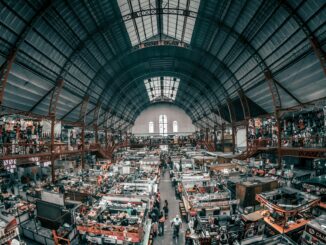
Many of you may be wondering Why Were Labour Unions Established During the Industrial Revolution? The need arose due to working conditions that were exploitative in nature where workers were working for long hours for less pay.
In South Africa labour unions can be divided into three different time periods: before the Union of South Africa was formed in 1910, from 1910 to 1948, and from 1948 to 1993.
The trade Unions were formed after those in Europe during the first period and were only open to European at first. Later African trade unions were formed and shortly after their creation some were involved with politics.
Introduction to the Industrial Revolution
During the late 19th Century, a drastic change was taking place in South Africa from being an agricultural society to an industrial society. One of the primary reasons this took place was due to the discovering of diamond deposits in Kimberly in 1867. This was followed by the discovery of Gold on the Witwatersrand.
Around 1700 many overseas nations were taken control by Britain as colonies. These colonies were producing and providing raw materials such as cotton, tobacco, sugar which was manufactured to Britain.
As these were labour intensive jobs, requiring strenuous efforts, there was a shortage in labour. However, this was resolved by the landowners and officials of the colonies by importing slaves from West Africa. Two million Africans were transported to work on plantations in British America until the abolishment of the slave trade took place in 1834.
One of the core turning points for labour unions during the industrial revolution was in 1915 – 1925. The policies of Smuts and Botha were favouring the concentration of people and goods which was crucial for industrialisation.
These polices were ensuring that industry was located on the Rand, which was close to the markets. And by 1949 half of the nation’s largest factories were in the Southern Transvaal although having relatively limited water.
What Lead to the Industrial Revolution?
Many people that question Why Were Labour Unions Established during the Industrial Revolution? It is due to the harsh and exploitative working conditions that people were being subject to at the time with low wages. The others reasons include:
- Some workers were working for over 18 hours a day in factories that were dark and had poor ventilation.
- When accidents took place, no compensation was paid to workers.
- Women and children were employed and paid lower wages than men.
- Vulnerable and desperate children from orphanages as young as 12 years old were forced to work.
- Working conditions in the coal mines were harsher than in factories.
- Women in the coal mines were pulling coal trucks through narrow and dangerous passages.
- Physical deforming was occurring in children due to the conditions of the work
- Factory owners and mining owners were accumulating all the wealth.
- Numerous workers were underpaid resulting an increase in unemployment
During the mid-1700s when vast numbers of people were moving towards the cities the demand for food was increasing. Prices were increasing due to the resulting of food shortages. People started uniting and organising public protests against low pays, exploitative working conditions and high prices of food. The demands of the people were:
- Higher wages
- Better housing
- Right to vote
This was the beginning of labour unions industrial revolution in South Africa.
Is there a Fourth Industrial Revolution in South Africa?
According to the United Nations Industrial Development Organisation South Africa has been experiencing a fourth Industrial revolution since COVID-19. This revolution has accelerated the use of technologies. These include:
- Using Artificial Intelligence (AI)
- Internet of Things (IoT)
- Increasing mobile applications
- Opportunities for digital learning platforms
- Augmented and virtual reality
- The emergence of 3D printing
- Rising of robotic technologies
However, in order to ensure these technologies continue to grow in South Africa, the country needs initiatives in developing appropriate connectivity services such as necessary infrastructure.
Key Labour Movements and Strikes in South Africa
When the industrial revolution was taking place, the unique economic and social contexts of the country influenced the labour movements in South Africa and the strikes. These are some notable labour movements that took place at the time:
- The 1913 Miners’ Strike
- The 1922 Rand Rebellion
- Formation of the Industrial and Commercial Workers’ Union (ICU) in 1919
- The 1946 African Mine Workers’ Strike
These movements and strikes were fundamental in forming the labour landscape in South Africa during and after the Industrial Revolution.
Notable Labour Unions in South Africa
These are some of the notable workers unions during the industrial revolution that took place in South Africa. This had a profound effect on the labour unions industrial revolution
- Metal and Allied Workers Union
- National Union of Textile Workers
- The first national and non-racial union federation
- African Mine Workers Union (AMWU)
- Council of Non-European Trade Unions (CNETU
- The Industrial Conciliation Act (ICA) of
Impact of Labour Unions on Workers’ Rights
The South African workers unions during the industrial revolution have a profound impact on the rights of workers. It included improving their working conditions, promoting equality and resolving disputes pertaining to labour. Some of these rights in depth consist of:
- Unions using collective bargaining in order to improve working conditions for workers
- Unions advocating for the fair and equal treatment and non-discrimination in the work place
- Unions providing a structured mechanism for resolving disputes helping them maintain industrial unity
- Unions have aided workers in becoming economic partakers, which is affecting their social standing and human dignity
- Improving the well-being of their members that are categorised into low market jobs
- Helping to meet the standards of workers that are underrepresented
Conclusion
The labour unions established in the industrial revolution had a significant impact on the South African workplace and in the lives of workers. It recognised and expanded the rights of workers, and paved way for their voices.
The workforce continues to evolve therefore the role of labour unions remains relevant in the present as it was in history. It is significant in order to ensure that labour practises within industries remain accountable, fair and equitable for all.
Key Points
- Labor unions were established to combat the harsh working conditions during the Industrial Revolution, where workers faced long hours, low wages, and unsafe environments.
- In South Africa, labor unions evolved through three key periods: before 1910, from 1910 to 1948, and from 1948 to 1993. Initially, these unions served only European workers, but later expanded to include African trade unions.
- The discovery of diamond and gold deposits in South Africa triggered rapid industrialization, shifting the country from an agricultural society to an industrial one.
- Significant labor movements and strikes during the Industrial Revolution in South Africa included the 1913 Miners’ Strike, the 1922 Rand Rebellion, the formation of the Industrial and Commercial Workers’ Union (ICU) in 1919, and the 1946 African Mine Workers’ Strike.
- The Fourth Industrial Revolution in South Africa, accelerated by COVID-19, is characterized by the rise of technologies such as AI, IoT, and digital learning platforms.
- Labor unions played a critical role in improving working conditions, advocating for equality, and providing dispute resolution mechanisms, which significantly shaped workers’ rights in South Africa.
FAQs
What was the role of the labor unions in the Industrial Revolution?
One of the main reasons for the creation of labour unions is to have improved communication between workers and employers. As there was a decline in working conditions during the Second Industrial Revolution, the need for better communication and working conditions was a must.
Why are labour unions important in South Africa?
Because they have the advantage of being part of an organised group in order to confront issues the workplace. And you don’t have to resolve them on your own.
What are the four types of unions in South Africa?
There are four broad type of unions in South Africa which consist of:craft, industrial, general, and white collar.
What is the biggest union in South Africa?
The biggest trade union federation in South Africa is the Congress of South African Trade Unions (COSATU or Cosatu). Founded in 1985, it is the largest out of the three main union sin the country, with 21 affiliated trade unions.

